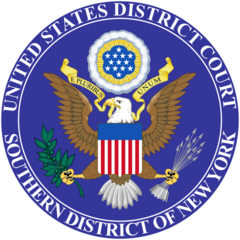Difference between revisions of "Philip Morris v. Sega"
From Sega Retro
(Created page with "{{LawsuitBob | image=Courtseal US NYsouth.png | title=''Philip Morris U.S.A. Inc. v. Sega Enterprises Ltd.'' | court=wikipedia:United States District Court for the Southern...") |
m |
||
| Line 1: | Line 1: | ||
{{LawsuitBob | {{LawsuitBob | ||
| image=Courtseal US NYsouth.png | | image=Courtseal US NYsouth.png | ||
| − | | title=''Philip Morris U.S.A. Inc. v. Sega Enterprises Ltd.'' | + | | title=''Philip Morris U.S.A., Inc. v. Sega Enterprises, Ltd.'' |
| court=[[wikipedia:United States District Court for the Southern District of New York|United States District Court for the Southern District of New York]]{{ref|https://archive.org/details/tobacco_tjbj0000}} | | court=[[wikipedia:United States District Court for the Southern District of New York|United States District Court for the Southern District of New York]]{{ref|https://archive.org/details/tobacco_tjbj0000}} | ||
| argued=1991-02-21{{ref|https://www.industrydocuments.ucsf.edu/docs/prlm0129}} | | argued=1991-02-21{{ref|https://www.industrydocuments.ucsf.edu/docs/prlm0129}} | ||
| Line 11: | Line 11: | ||
| holding= | | holding= | ||
}} | }} | ||
| − | '''''Sega Enterprises Ltd. v. Accolade, Inc.''''', 91 CIV. 1292 (JFK), is a 1991 case in which [[wikipedia:Philip Morris International|Philip Morris International]] sued [[Sega Enterprises]] for infringing on its [[wikipedia:Marlboro|Marlboro]] trademarks in the 1989 arcade game ''[[Super Monaco GP]]''. Philip Morris first threatened litigation on November 20, 1989{{ref|https://www.industrydocuments.ucsf.edu/docs/lryh0122}}, with Sega quickly agreeing to remove the infringing material and beginning to circulate a new revision of the game to arcades. However, adoption of the updated revision was not good enough for Philip Morris, who sued on February 21, 1991.{{ref|https://www.industrydocuments.ucsf.edu/docs/prlm0129}} Ultimately, the two companies entered into a settlement on March 19, 1992.{{ref|https://www.industrydocuments.ucsf.edu/docs/rkvh0182}} | + | '''''Sega Enterprises, Ltd. v. Accolade, Inc.''''', 91 CIV. 1292 (JFK), is a 1991 case in which [[wikipedia:Philip Morris International|Philip Morris International]] sued [[Sega Enterprises]] for infringing on its [[wikipedia:Marlboro|Marlboro]] trademarks in the 1989 arcade game ''[[Super Monaco GP]]''. Philip Morris first threatened litigation on November 20, 1989{{ref|https://www.industrydocuments.ucsf.edu/docs/lryh0122}}, with Sega quickly agreeing to remove the infringing material and beginning to circulate a new revision of the game to arcades. However, adoption of the updated revision was not good enough for Philip Morris, who sued on February 21, 1991.{{ref|https://www.industrydocuments.ucsf.edu/docs/prlm0129}} Ultimately, the two companies entered into a settlement on March 19, 1992.{{ref|https://www.industrydocuments.ucsf.edu/docs/rkvh0182}} |
==History== | ==History== | ||
Revision as of 02:40, 1 March 2024

|
| Philip Morris U.S.A., Inc. v. Sega Enterprises, Ltd. |
|---|
| Court: United States District Court for the Southern District of New York[1] |
| Argued: 1991-02-21[2] |
| Decided: 1992-03-19 (settled)[3] |
| Citation(s): 91 CIV. 1292 (JFK) |
Sega Enterprises, Ltd. v. Accolade, Inc., 91 CIV. 1292 (JFK), is a 1991 case in which Philip Morris International sued Sega Enterprises for infringing on its Marlboro trademarks in the 1989 arcade game Super Monaco GP. Philip Morris first threatened litigation on November 20, 1989[4], with Sega quickly agreeing to remove the infringing material and beginning to circulate a new revision of the game to arcades. However, adoption of the updated revision was not good enough for Philip Morris, who sued on February 21, 1991.[2] Ultimately, the two companies entered into a settlement on March 19, 1992.[3]
History
In February 1991, the American tobacco company Philip Morris International sued Sega Enterprises, Ltd. for unauthorized use of their branding in the game Super Monaco GP (which features thinly-veiled parodies of popular racing sponsors). An initial complaint was filed when one of Philip Morris's lawyers spotted Marlboro branding while visiting an arcade on November 15, 1989.[4][5] Five days later[4], the company sent a cease and desist to Sega, demanding they remove what it saw as trademark infringement immediately (citing that it did not want to be seen advertising to minors[6]). Around the same time of this incident, Philip Morris published an advertisement warning against the unauthorized use of its trademarks, including that of Marlboro.[6]
Co-chairman of Sega David Rosen issued a statement shortly claiming that the inclusion of "fleeting billboard parodies" was an "innocent attempt to mimic real-life locations and scenery to enhance the realism of game play"[7]. It had been claimed that the in-game banners were sponsored by Philip Morris, something both companies denied. The Marlboro advertisements were also criticized by the US Federal Trade Commission as many arcade users at the time were children.[8]
Both companies entered into an initial settlement on March 20, 1990, with Sega agreeing to remove Philip Morris branding from the game.[4] Sega completed the changes and began issuing free conversion kits to arcades in March 1990[9], plus a $200 check to entice arcade operators into making the change. However, adoption of the kit was not good enough for Philip Morris, who sued on February 21, 1991[2] when it emerged many older cabinets were still in active service.[10]
Results
On March 19, 1992, the two companies agreed to a settlement.[3] Sega would continue issuing conversion kits containing the upgraded revision of Super Monaco GP to North American arcades, alongside replacement decals and artwork for game cabinets. Sega was also required to place advertisements in RePlay and Play Meter magazines for 3 months, advertising the existing $200 reward for adopting the conversion kit - returned game hardware was required to be destroyed.[3] The company was required to buy back games from arcade operators for 10 years, and additionally pay Philip Morris $20,000 in legal feels.
Legacy
Sega would distance itself from utilizing official Formula One cars and sponsors in the home ports of the game.[11]
External links
- Sega Legends: Philip Morris Sued Sega Over Unauthorized Marlboro Ads article by James Barton at Sega-16
References
- ↑ https://archive.org/details/tobacco_tjbj0000
- ↑ 2.0 2.1 2.2 https://www.industrydocuments.ucsf.edu/docs/prlm0129
- ↑ 3.0 3.1 3.2 3.3 https://www.industrydocuments.ucsf.edu/docs/rkvh0182
- ↑ 4.0 4.1 4.2 4.3 https://www.industrydocuments.ucsf.edu/docs/lryh0122
- ↑ https://www.industrydocuments.ucsf.edu/docs/jqxj0113
- ↑ 6.0 6.1 https://www.industrydocuments.ucsf.edu/docs/jyvc0119
- ↑ File:SuperMonacoGP US Statement 1990-01-12.png
- ↑ ACE, "April 1991" (UK; 1991-03-08), page 8
- ↑ File:SuperMonacoGP US Letter ConversionKit 1990-03-15.pdf
- ↑ https://www.industrydocuments.ucsf.edu/docs/sjnb0134
- ↑ Super Monaco GP
